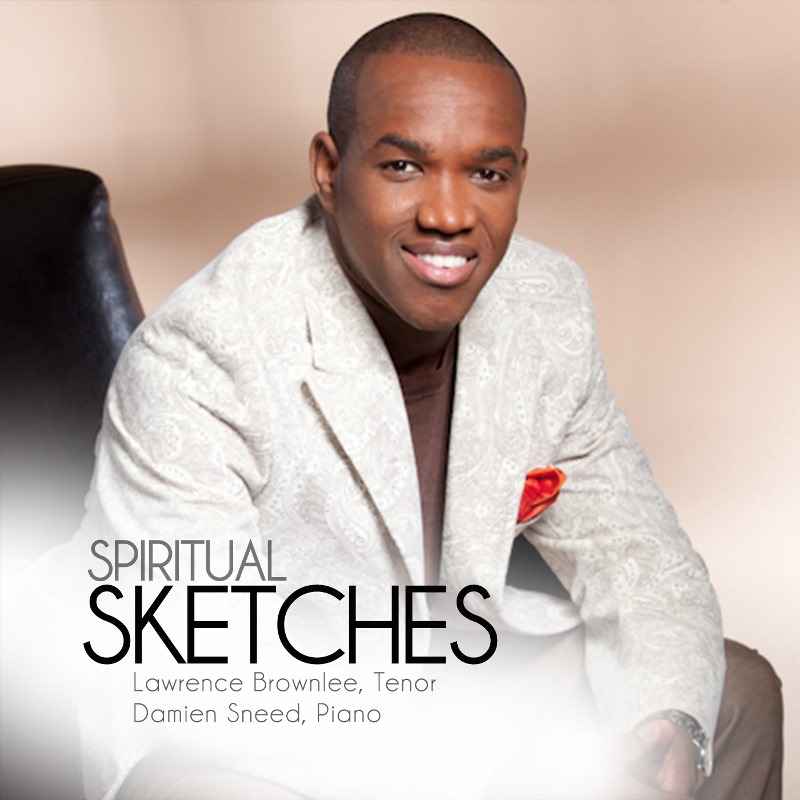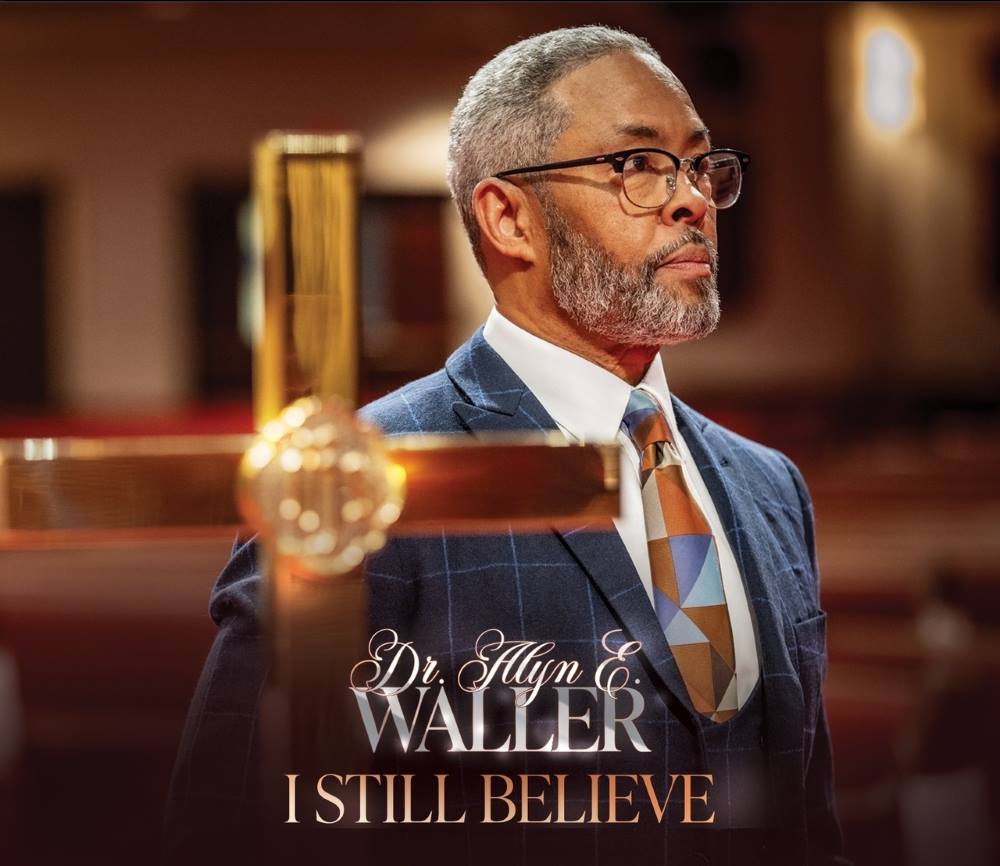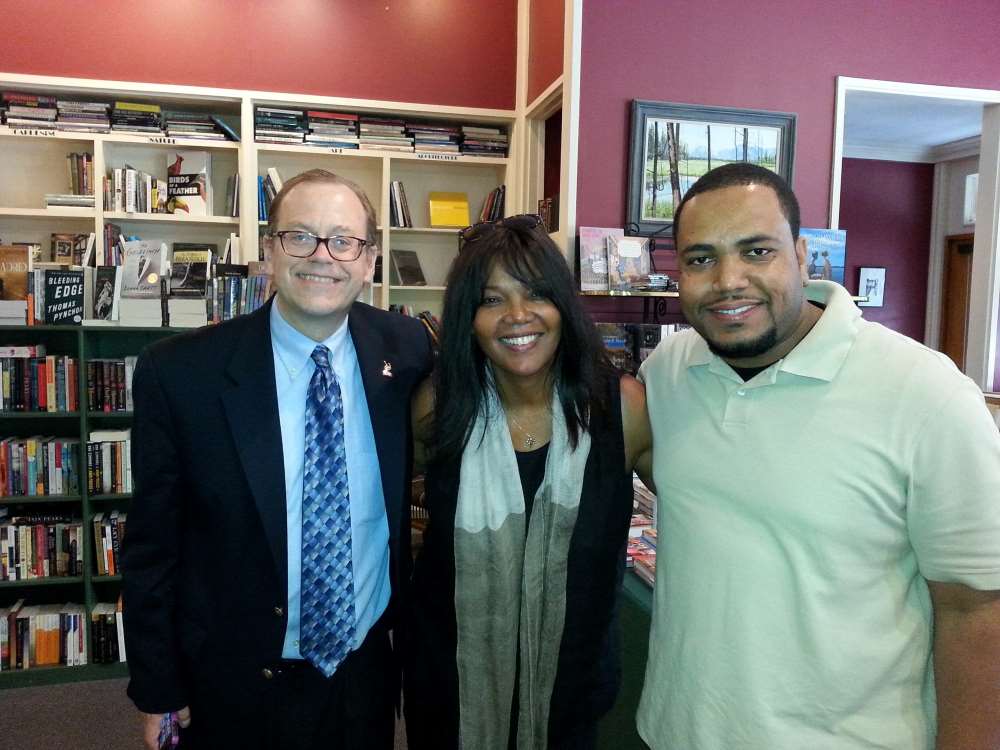By Bob Marovich for The Black Gospel Blog.

On June 11, 2013, LeChateau Earl Records released
Spiritual Sketches, a collaboration on the spirituals between operatic tenor Lawrence Brownlee and producer-arranger Damien Sneed. Sneed’s artful arrangements and Brownlee’s demonstrative vocals are breathing new life into one of the most original American art forms, the spiritual.
TBGB talked with Brownlee and Sneed immediately following the album’s release.
TBGB: Damien and Lawrence, what was your earliest exposure to gospel music in the church?
DS: I got my start in my home church, Good Shepherd Baptist Church in Augusta, Georgia. My exposure to gospel music was there, and also from watching television shows like PTL with Jim and Tammy Faye Bakker, and Bobby Jones Gospel.
LB: I was born and raised in the Church of God in Christ. My father directed the choir, my mother sang solos. Music was always in the house. My mother tells me of a time when I was a young child, singing “Go Tell It On the Mountain”—in my sleep!
TBGB: Damien, what prompted you to pursue gospel music as a profession?
DS: It’s more of a calling than something that I specifically chose to pursue. I enjoy gospel music because through it, I’m able to reach other people, to touch them with the message in the music.
TBGB: Were there particular artists who inspired you?
 |
| Damien Sneed |
DS: Two artists who really inspired me were Richard Smallwood and Twinkie Clark. I have been blessed to work closely with both of them.
TBGB: How did you meet Lawrence Brownlee?
DS: Through a mutual friend, Weston Sprott, who is the principal trombonist at the Metropolitan Opera. This was in 2012, I think in January. I was backstage after an opera Lawrence sang in at the Met, and we had a chance to meet. We all went out to dinner. In fact, we decided to collaborate on Spiritual Sketches at that dinner!
TBGB: So you discovered a mutual affinity for the spiritual?
DS: Yes, and a mutual background growing up in the church, growing up with gospel music, and being trained classical musicians.
TBGB: Lawrence, what prompted you to pursue classical vocal training?
 |
| Lawrence Brownlee |
LB: I was involved in music in the church and that spilled over into school. People would ask me to sing solos at school assemblies. Then I got involved in choir. In high school, there was a program for gifted music students and a part of that program meant giving a performance. I offered a classical song and people told me I should pursue classical music.
TBGB: How did you decide on what spirituals to include on Spiritual Sketches?
DS: We both submitted spirituals that were our personal favorites, and from there, I began to create the arrangements and send them to Lawrence as mp3s, via email. The first time we had a chance to work on some of the songs in person was backstage in Avery Fisher Hall, when Lawrence was performing at Lincoln Center. We had one rehearsal for a few hours, and went into the studio the next day. We recorded December 4 and 5 of last year.
TBGB: Why do you think spirituals don’t receive as much attention as they deserve?
DS: I believe it’s because the art form is almost forgotten. That’s the main goal Lawrence and I had in mind in doing the spirituals. We wanted to enable young people to be a part of the tradition of the African American spiritual, so we set the songs in such a way that there are elements of the modern, current sound. Of course it is classical, but we blended it with jazz and gospel, so it’s a hybrid of all of them.
LB: Oftentimes spirituals are done in a way, I wouldn’t say dated, but they are done using old performance practices and traditions. And because of that, young African American singers who want to sing in the classical realm don’t want to be labeled or pegged as a “black singer” by singing spirituals. It reverts back to an old mentality. They want to sing Puccini, Mozart—to establish themselves as singers of other repertoire, so they tend to shy away from spirituals. I don’t know of too many people who specialize in spirituals.
TBGB: Damien, how did you decide what spirituals should get what kind of arrangement?
DS: Lawrence and I spoke about “Every Time I Feel the Spirit” when we were backstage at Avery Fisher. He gave me some of his ideas. As far as the others, I looked at the lyrics and it was divine inspiration. I began playing a melody that came to me from looking at a few lyrics, or I sang something and whatever I heard in my spirit, I created the arrangement around that.
LB: In African American spirituals, there is always that element of improvisation, so even what Damien wrote on the page is a little different from what is on the CD. There is room for interpretation, which I say is driven by the spirit, and others might say is driven by emotion, what you are going through at that particular time.
TBGB: What do you hope Spiritual Sketches will evoke in its listeners?
DS: One of the reasons for the creation of this project was for more people to be exposed to different genres of music. For example, we wanted to create a space for people who only listen to classical music to feel okay with exploring jazz and gospel. We also wanted those who don’t necessarily listen to gospel music to be overtaken by the ministry that is in the spirituals.
LB: Yes, there seems to be some type of divide where people can’t like one type of music without hating the other type. When people listen to the radio, they don’t realize that they are listening to artists who were influenced by Brahms or Beethoven, or this person or that person. So what we’ve done is to bring these sounds together. We want to bridge that divide.
Thus far, people have responded overwhelmingly in a positive way. At the CD release party, people came up to us and said, “That really touched me.” I think that means more than hearing “Oh, you’re a great pianist, arranger, or singer.” When people walk away really touched by the music, that’s success.
TBGB: Do you have plans to do a second volume of Spiritual Sketches in the future?
LB: (laughing) We’ve already talked about it! The material is there. Damien’s creativity is there. When we talked to Wynton Marsalis, who has really been enthusiastic about this project, he said we have to do something else, we have to continue to do this.
For more information about Spiritual Sketches, visit www.lechateauearl.com
 On June 11, 2013, LeChateau Earl Records released Spiritual Sketches, a collaboration on the spirituals between operatic tenor Lawrence Brownlee and producer-arranger Damien Sneed. Sneed’s artful arrangements and Brownlee’s demonstrative vocals are breathing new life into one of the most original American art forms, the spiritual.
On June 11, 2013, LeChateau Earl Records released Spiritual Sketches, a collaboration on the spirituals between operatic tenor Lawrence Brownlee and producer-arranger Damien Sneed. Sneed’s artful arrangements and Brownlee’s demonstrative vocals are breathing new life into one of the most original American art forms, the spiritual.











 Visit Today : 10
Visit Today : 10 This Month : 293
This Month : 293
Keep up the good work guys.
Gospel, BLK, Kin.